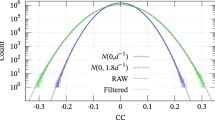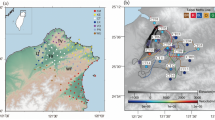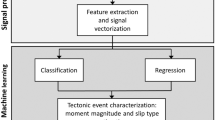Abstract
SEISMIC interpretation at the University of Tasmania has been enhanced by using very-low-speed magnetic tape recordings in conjunction with the normal pen recordings. When played back with a time compression of 250, the outputs from the short period ‘Willmore’ seismometers become audible. By comparing the tape and the pen recordings for earthquakes easily identifiable on the pen recordings it has been found, once the various tones are memorized, that it is not only possible to hear seismic activity which is lost in background noise on the pen records, but also to tell approximately the region from which they originated. Since a 2,400 ft. reel of 0.25 in. magnetic tape lasts approximately 3 months if used continuously, this slow-speed recording also affords an economical way of permanently storing the records in an electrical form.
This is a preview of subscription content, access via your institution
Access options
Subscribe to this journal
Receive 51 print issues and online access
$199.00 per year
only $3.90 per issue
Buy this article
- Purchase on Springer Link
- Instant access to full article PDF
Prices may be subject to local taxes which are calculated during checkout
Similar content being viewed by others
References
Newstead, G., and Watt, P. A., Nature, 186, 704 (1960).
Author information
Authors and Affiliations
Rights and permissions
About this article
Cite this article
MUIRHEAD, K., READ, L. Slow-speed Tape Recordings of Seismic Signals. Nature 210, 929–930 (1966). https://doi.org/10.1038/210929b0
Issue Date:
DOI: https://doi.org/10.1038/210929b0
Comments
By submitting a comment you agree to abide by our Terms and Community Guidelines. If you find something abusive or that does not comply with our terms or guidelines please flag it as inappropriate.



